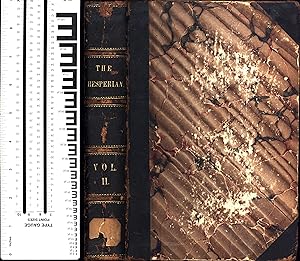Gallagher William Edited Otway Curry (1 results)
Product Type
- All Product Types
- Books (1)
- Magazines & Periodicals
- Comics
- Sheet Music
- Art, Prints & Posters
- Photographs
- Maps
-
Manuscripts &
Paper Collectibles
Condition
- All Conditions
- New
- Used
Binding
- All Bindings
- Hardcover
- Softcover
Collectible Attributes
- First Edition
- Signed
- Dust Jacket
- Seller-Supplied Images
- Not Printed On Demand
Seller Location
Seller Rating
-
The Hesperian; a Monthly Miscellany of General Literature, Original and Select / Volume II (INCLUDING EDITOR WM. GALLAGHER'S OBITUARY OF THE GREAT INDIAN LEADER BLACK-HAWK, OTWAY CURRY'S BIOGRAPHICAL SKETCH OF INDIAN FIGHTER SAMUEL DAVIS, AND CHAPTERS 9 THROUGH 24 OF THE HISTORICALLY IMPORTANT 'NOTES ON TEXAS')
Published by Published by John D. Nichols, Columbus, Ohio, 1838
Seller: Cat's Curiosities, Pahrump, NV, U.S.A.
First Edition
Hardcover. Condition: Good. No Jacket. 1st Edition. Octavo bound volume of the monthly in original half leather over marbled boards. Some moderate ancient insect predation ("worming"?) to top and bottom two inches of front board interior along the front hinge. Also a goodly amount of rubbing to boards and along edges of leather spine, though volume remains tightly bound; grade it "good" overall, though pp. 289-336 of Number Four (April), which were printed on a different stock, have browned a bit more than the rest. Bookplate of the Franklin Institute Library of Philadelphia to front pastedown, indicating this volume was the gift of Maria Heyl, likely 1822-1900 of Bala Cynwyd. There is also a Franklin Institute blindstamp to top corner of first page of text, but blessedly we find no edge stampings, no lending-library attachments, card-holders, cross-outs, etc. Issue number 5 -- presumably May, and including some of "Notes on Texas" -- is PRESENT (sometimes missing from bound volumes), but pp. 489-492 are missing, as usual. (Since the absence of pages with those numbers creates no break in text, and given the absence of any reference to those pages in Index, it's possible there never were any such pages.) A brief "Valedictory" announces the retirement from editorship of poet Otway Curry, though he continues contributing, including a 7,000-word biography of Indian fighter Samuel Davis. Wm. Gallagher's editorial (crediting Benjamin Drake) on the death of the great Sac Indian leader and warrior Black-Hawk, a 6,500-word biography singularly sympathetic for the time, describing the Black-Hawk War of 1832 as "characterized by so much bravery and fortitude on the part of the Indians, and such cruelty and baseness on the part of the Americans -- in which imploring men were hunted down like wild-beasts, and helpless women and children given to the water and the sword. . . ." The editor also offers a remarkable essay endorsing the complaints of education reformer Josiah Holbrook (1788-1854) against "rote learning," which condemns children to "intolerable drudgery" which actually causes them to dislike the books from which they're required to recite, holding that "outdoor instruction has been too much neglected; education having been conducted on the principle of looking out the window at things, instead of visiting objects and learning their properties and uses. . . . The teacher should take occasion to instruct in the fields, in ship-yards, in the crowded streets . . ." Also featuring C.D. Drake's 3,700-word essay praising the perseverance of Robert Fulton in pursuing his dream of steam-powered navigation, and the editor's lengthy, 7,400-word sketch on "The Early Settlements and Early Men of Kentucky," which is in essence a biography of that "great and good man," Daniel Boone. Yet what is most of note here is the serialization of Chapters 9 through 24 (the end) of the anonymous travelogue "Notes on Texas" (the first 8 chapters having appeared in Volume I, 1837.) These essays were collected by the University of Texas Press in 1988 as "Texas in 1837," those editors explaining: "Written anonymously in 1838-39 by a 'Citizen of Ohio,' this is the earliest known account of the first year of the Texas republic. Providing information nowhere else available, the still-unknown author describes a land rich in potential but at the time 'a more suitable arena for those who have everything to make and nothing to lose than for the man of capital or family.' The author arrived at Galveston Island on March 22, 1837, before the city of Galveston was founded. . . . His travels took him to Houston, then little more than a camp made up of brush shelters and jerry-built houses, and as far west as San Antonio. . . . He attended the first anniversary celebration of the Battle of San Jacinto and has left a memorable account of Texas' first Independence Day. His inquiring mind and objective, acute observations . . . provide us a way of . . . revisiting landmarks that have vanished forever." Reduced from $195.


